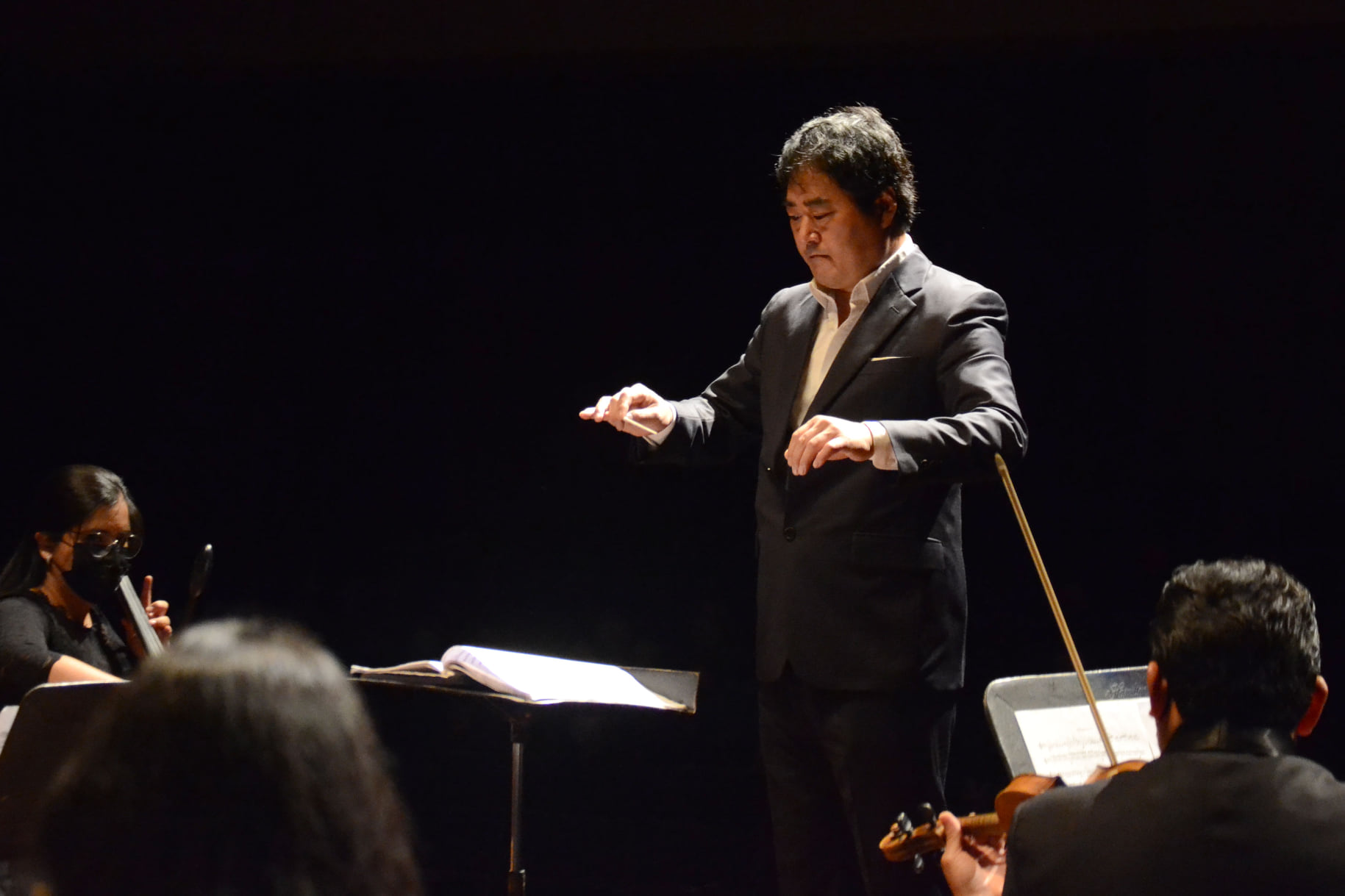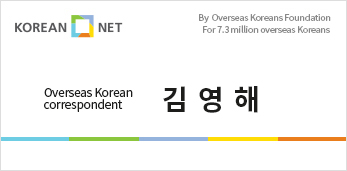Overseas Koreans Platform
- Main page
- Overseas Koreans Platform
- News Room
News Room
- Main page
- Overseas Koreans Platform
- News Room
- Country
- Argentina
- Date
- 2023.05.09
Concert by the Córdoba Symphony Orchestra commemorating the 150th anniversary of Rachmaninoff's birth

The Teatro del Libertador in Córdoba, Argentina was packed with people attending a concert to celebrate Rachmaninoff's 150th birthday at 8 PM on April 22. The audiences were immersed in the performance of Rachmaninoff's Piano Concerto No. 2 put on by the Córdoba Symphony Orchestra and pianist Irina Dichkovskaya as well as the symphony's performance of Rachmaninoff's Symphonic Dances, applauding the beautiful melodies and passionate performances. As the performance came to an end and the standing ovation continued, it was the conductor, Park Jong-hwi, who drew the most attention.
He was appointed as the conductor of the Córdoba Symphony Orchestra on April 5 last year, and since then, he has attracted the attention of the public with his unique behavior compared to his predecessors. He led the popularization of classical music, which had been considered the preserve of a selected few. And many operas, ballets, orchestras, and choral works reinterpreted under his direction were presented to the public. Last December, the city cathedral in Córdoba hosted a Christmas concert with the Córdoba Symphony Orchestra and it received an ardent response from the audiences who didn't leave their seats and sang along. His conducting style is very creative and sometimes he even throws dolls to the audience to make them smile.
In February of this year, the orchestra opened the season with a performance of the Radetzky March, The Blue Donau Waltz, Voices of Spring Waltz, and The Bat by Johann Strauss, and impressed the audience. An audience member named Jose said, "His music has the healing, emotion, and vision of art. We are very lucky to have him in Córdoba." Another audience member by the name Nicholas said, "Park Jong-hwi's passionate conducting makes you immerse yourself in the music. I can feel passion, dedication, and love in this performance." Chorus member Mariana said, "We call him Cabezón. It means that he has the grit to finish what he starts."
We interviewed Mr. Park Jong-hwi.
Reporter: When I first heard of Córdoba as a child in the cartoon movie Marco: 3000 Leagues in Search of Mother, it didn't seem real. Years later, I was impressed to hear that the city's symphony conductor was Korean. You are known as the first Asian conductor in Latin America. How did you end up at the Córdoba Symphony Orchestra?
Park: I majored in conducting at the Korea National University of Arts and studied at the Moscow State Tchaikovsky Conservatory Academic Music College. After that, I led orchestras in Russia, Ukraine, Italy, Hungary, Austria, United States, South Korea, Japan, Argentina, Chile, Brazil, Bolivia, Mexico, Ecuador, and Paraguay. I have served as assistant conductor of the Kharkiv Philharmonic in Ukraine. Since then, I have served as an adjunct professor at Dong-A University, assistant conductor of the Changwon City Symphony Orchestra, music director of the Asuncion City Symphony Orchestra in Paraguay, professor of conducting department at the National University of Asuncion, and principal guest conductor of the National Symphony Orchestra of Paraguay. I was asked to serve as a guest conductor for the Córdoba Symphony Orchestra and was voted in as the conductor by the members. At the time, there were many strong contenders, including conductors from different countries, but the Argentine pianist Bruno Leonardo Gelber, one of the greats of Argentine music, highly recommended me. So, I conducted my first guest conducting with him in 2021. This led to my appointment as the principal conductor on April 5, 2022.
Reporter: Actually, I thought the Argentine music scene would be conservative. In a country with a long and proud musical history that has produced pianists Martha Argerich, Bruno Gelber, and conductor Daniel Barenboim, it's quite a leap to choose an Asian musician as a conductor. As I watched the performance, I was proud to see a symphony orchestra from Argentina following the Korean conductor's lead in unison. A long time ago, it overlapped with a memory of Japanese conductor Seiji Ozawa conducting the Boston Symphony Orchestra. Back then, I wondered when we would have such a world-class conductor, and now that you are here, I’m thrilled. Were there any challenges like racism or discrimination?
Park: Actually, I hardly felt anything like that. “Artists recognize artists.” In other words, an artist speaks with art. It's hard to compare, but I've been told that my style is very different from my predecessors. For example, I think the Korean spirit of "if it can't be done, make it happen" was a new thing to them. Once, a performance was about to cancel. While everyone was accepting that there was nothing we could do about it, but I made it happen. In addition, I think that inviting famous performers from abroad and securing sponsorships has given the members the impression that I am not just sitting on my position, but I am dedicated to the symphony.
Reporter: Maria Alvarez, a member of the choir, is very pleased with the level of singing since Park Jong-hwi arrived. As a vocal music major, you have a good understanding of choral music, and your enthusiastic behavior raises the morale and motivation of the singers. Also she said taht you serve Korean food, such as bulgogi and kimchi, to their members, which makes you even more popular.
Park: I think that's true in any field, but I think leadership is absolutely essential in things like opera and orchestras, where you have to work with a lot of people. Thankfully, they seem to enjoy playing with me. I was practicing Gustav Mahler last August. I couldn't the sheet music I left in the practice room. For some reason, players took the sheet music to practice at their home. Players used to play mostly in the practice room and rest at home, but they have changed. They said the conductor's enthusiasm was contagious.
Reporter: I heard that the Córdoba Symphony Orchestra is one of the top three symphony orchestras in Argentina. I saw it today, and it's quite large.
Park: Yes. The city of Córdoba itself is the second largest city in Argentina, after Buenos Aires, and was founded in 1651 and is considered one of the most advanced city of education, music, and culture. The Córdoba Symphony Orchestra is not only historic - last year was its 90th anniversary - but it's also big. We currently have a total of 95 performers. And in Córdoba, there's the Teatro del Libertador, which is 132 years old, and it's modeled after an Italian theater, so the acoustics are very good, and the building itself is beautiful.
Reporter: What are your plans for playing in the future?
Park: I'm planning an international conducting competition with the Córdoba Symphony Orchestra here in Córdoba next February, and I'm also planning a tour in the United States. Each year we perform two operas and two ballets, and this year we will perform The Butterfly Lady, La Traviata, and Cavalleria Rusticana.
Reporter: Do you have a personal philosophy about music?
Park: Art makes people happy. I've been around music my whole life. But I went through a lot of frustration and pain to stay on this path. I feel like my music is everything I've ever lived. Music has brought pain to my life, but it has also brought me more joy. I see Latin American youth falling prey to drugs, violence, and other temptations at an early age and ruining their lives. I've traveled all over Paraguay teaching students through the Voice of the Earth Music Foundation. I saw them enjoying the music itself, and it was very innocent. I'm convinced that young people in Latin America, even if they don't necessarily major in music, will have their lives changed by music. The value of music to young people is not only the vision and sense of accomplishment it provides, but also the sense of community, order, cooperation, concession, companionship, shared social sentiment, and responsibility.
Reporter: You've been active in Latin America for a long time. Do you have any personal reflections or wishes?
Park: In Korea, I think the space for classical majors is very narrow. Also, even if you've studied music from a young age and studied abroad and achieved PhDs, there's a fierce competition. I think it's a good idea not to limit themselves to Korea, but to promote Korea abroad. For me, my breakthrough in that situation was Latin America, and I'm very grateful for the opportunities it gave me. But as a pioneer and a trailblazer, there were challenges, but I'm getting a lot of offers from different countries these days. So it looks like 2024 is going to be a very busy year.
Reporter: I think it's a huge private diplomacy for South Korea. I expect to see more supporters and hope that what you're doing continues to expand. I wish you all the best with your current endeavors and the growth of Korean classical music. Thank you.
Park Jong-Hwi
Principal Conductor, Córdoba Symphony Orchestra
Principal Guest Conductor, Los Angeles Sinfonietta
General Director, Latin American Symphony
Artistic Director, K-Classic
Judge, WMU International Conducting Competition
Secretary General, World Association of Conductors
